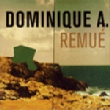|
|

Dominique A Remué Lithium Moved. That's is the feeling I get after listening to the new album of Dominique A called Remué (well, it's a pun because the French word for "moved" is ... "remué"). It was released one month ago, and it's difficult to be indifferent to it. Personally, I think it could be number one of the darkness top. Some parts are difficult to get into, but Dominique A has had difficulties when recording it also. He recently announced that its name was initially Le Parcours Du Bègue (a literal translation could be 'The Course Of A Man Who Has A Stammer'), because he thought that the idea of this man who has difficulties to express himself was a good image to describe the recording of the album. Dominique A, whose full name is Dominique Ané, has released 4 albums, plus Le Disque Sourd, an autoproduct album which cannot be found nowadays. La Fossette, released in 1992, was recorded "at home" on 4-tracks, and it's certainly the most minimalist album of the discography of Dominique A. The next, Si Je Connais Harry, is more structured. La Mémoire Neuve, released in 1995, is for me, one of the French musical masterpieces at the end of the century. By showing more maturity, and richness in instrumentation, this album contains the most beautiful songs of Dominique A (Twenty-Two Bar, Le Métier De Faussaire, Les Hauts Quartiers, and Ainsi Parfois La Vie Rend Modeste), with a bit of cynicism with the song Il Ne Faut Pas Souhaiter La Mort Des Gens ("Il ne faut pas souhaiter la mort des gens, ça les fait vivre plus longtemps" / "One should not wish for the death of people, that makes them live longer"). According to the author, it's the "the most disgusting" song that he has written. In any case, Dominique A has opened his mind to others with this album, which is a fine contrast to La Fossette. The wealth of the instrumentation and the mix of musical styles are more obvious on Remué. Released 4 years after La Mémoire Neuve, recorded with new musicians in New York (Rare Book Room studio, Brooklyn) and Brittany, this album proves that Dominique A refuses the easiness. For him, all was said with the 3 first albums, so he should challenge himself for the next album. First, he changes his manner of singing, more speaks than sings, and also, he wants more hardness, more fighting spirit, particularly in the lyrics. In any case, he has been successful on this point, because, except for Rien Qu'á Voir which is a little disillusioned ("Je sais que tu ne viendras jamais" / "I know you will never come"), all the words illustrate this desire for fight, but not necessarily with violence. Dominique A has changed his manner of working. Everything begins with the lyrics, and then he winds the music around them, save Le Détour and Avant L'Enfer, which perhaps are more melodic. The music is most often disconcerting for the others songs: atonal music, obscure samples, noisy guitars, delicate balance between electric and acoustic... In spite of everything, there is nevertheless some progression, a master line in this album. First of all, Dominique A attacks with Comment Certains Vivent (noisy guitars), Pères and especially Encore, broken down, with a catchy piano and minimalist words, close to the spirit of the first album La Fossette. We can feel a certain musical appeasement with Avant L'Enfer and Je Suis Une Ville ("Je suis une ville dont beaucoup sont partis, enfin pas tous encore mais ça se rétrécit /.../ mais mes poches sont vides et ma tête est ailleurs, je suis une ville qui ne sait plus lire l'heure, qui a oublié l'heure" / "I'm a town from which a lot of people have left, still not all but this is narrowing /.../ but my pockets are empty and my head is somewhere else, I'm a town which can no more know the time, which has forgotten the time"). The next songs are quieter, less gloomy, with some hope, as the magnificent Exit, the encounter between Dominique A and trip-hop, the very calm Le Détour, and the beautiful melancholy of Rien Qu'á Voir. Contrasted with Douanes and Ma Vieille Tête, with disturbing lyrics... The end of the album is more experimental, in particular Le Morceau Caché. In short, an amazing album, indefinable, which should have an influence on the career of Dominique A... Last detail: Dominique A has met Damon and Naomi (the famous ex-Galaxie 500), after the recording of one of their songs (E.T.A. from More Sad Hits) with Squad Femelle for his own label Bilbo Products. Later they've played live together, for the festival of Nantes called "Fin De Siècle". Copyright © 1999 Patrick Dubail
|
| © 2011 Luna Kafé |